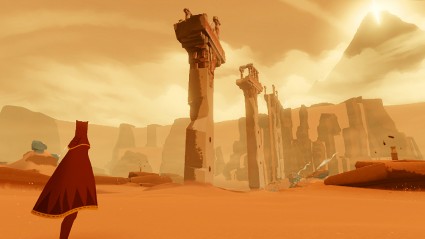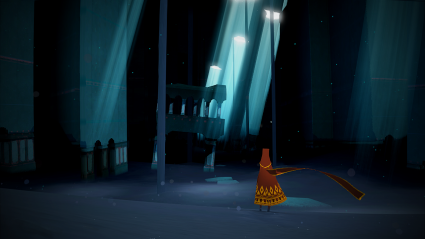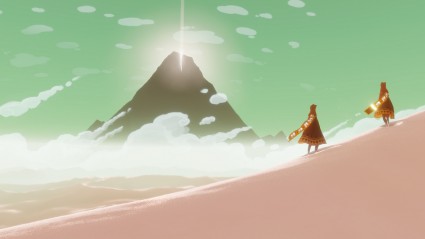Features & News
Interview: Kellee Santiago (thatgamecompany)
March 2, 2012, Author: Paddy
Thatgamecompany designs and develops artistically crafted, broadly accessible video-games that push the boundaries of interactive entertainment. It was founded in the Spring of 2006 by Jenova Chen and Kellee Santiago, two graduates of the University of Southern California Interactive Media MFA program. They had worked on several projects together, including the multi-award winning student game, ‘Cloud,’ and decided to continue working together on small, experimental games by forming a game studio that would focus on these projects.
In 2011, Kellee Santiago was named as one of the Gaming Industry’s Ten Most Influential Women of the past decade, alongside fellow luminaries Kim Swift and Amy Hennig.
With their upcoming title ‘Journey’, thatgamecompany are now inviting players to explore a new mysterious world and discover its hidden history by either travelling alone, or adventuring with strangers that they meet along the way.
We sat down with Kellee Santiago for a chat about crafting worlds of immersion that people can truly lose themselves within.
“Life is a Journey, not a destination” – Ralph Waldo Emerson
Q. Hi Kellee, many thanks for taking time out to talk to thisismyjoystick.com. Can you tell us a little about your background and how your passion for games led to the formation of thagamecompany with Jenova Chen?
“I have always played and loved video-games, but never thought about making them until I was at the University of Southern California. It was there I got exposed to the process of game development and the people who want to make them, and fell in love. I loved, and still do love, the opportunity we have in video-games to create compelling interactive experiences that express a wide variety of emotions. There’s so much opportunity to do something new and fresh and to have a huge impact on a growing medium.”
Q. Upon founding thatgamecompany with Jenova, was it a conscious decision to strike out and move away from more traditional gaming genres?
“Yes, it’s what Jenova and I both individually were interested in when I started working with the Cloud development team at school. Through the process of finishing “Cloud”, Jenova and I recognized we had similar ambitions. The viral success of Cloud in conjunction with the launch of new digital distribution networks presented us with the opportunity to create a studio upon graduating that would focus on creating these unique game experiences.”

Journey is a game like no other.
Q. What do you think inspires the team on a day-to-day basis?
“Really, anything! Everyone at thatgamecompany is passionate about interactive entertainment, and is always thinking about it and taking inspiration from the world around us.”
Q. thatgamecompany seem to have really captured the collective imagination of gamers the world over, and tapped into an area of the gaming market that had remained largely unexplored. At the drawing board stage are there a number of specific factors that become game play foundations, or is every project a completely organic creation?
“Our games often start with a question, or an idea for an experiment. With flOw, we wanted to give players control over the game’s level of difficulty, to see if it changed their experience of challenge. In Flower, we made the environment the central character of the experience, instead of just the background, to try and create a new feelings within our players.
With Journey, we asked ourselves: What is the typical experience of online play and how can we change it? From that point, we determine the features and the process for development that would best suit the kind of experience we are trying to achieve.
All of our games have involved rapid iteration prototyping, though, from the first week. The development team tries to mock up a play experience in whatever tool works best (for Flower it was XNA, for Journey it was Flash) so that we can get people (usually friends & and family early on) to play and tell us how close we are to figuring out the gameplay that will best suit the experience.”
Q. I would imagine It must seem as daunting as it is exciting when you start out with the seed of an idea and it begins to take on a life of its own?
“Absolutely. For a long time the team doesn’t know what the game is, and they can begin to feel like they might never find it. Then, it starts to take shape. It starts to live outside of us, and then it’s just about finishing up what we see and making it great.”
Q. For those of our members who may not know much about Journey, how would you describe the game to them, what can they expect?
“In Journey, you take the form of a traveler heading to the Mountain. The game is set in a vast desert world with shifting, glittering sands and mysterious, ancient ruins. As you travel and explore the world, your goal is to discover what took place in the world and why you are there. Along the way, you may bump into other travelers who are heading the same way. You can explore with one other person at a time.
What makes Journey unique is that there are no lobbies, chat or voice capabilities. People come into your game seamlessly, as they cross your path, and you are completely anonymous to each other, so you must let your actions speak for you.
Will you choose to stay with someone you meet or you walk off on your own? The decision is completely up to you.”

Will it be a lonely experience, or a cooperative experience for you?
Q. Would I be right in guessing that it must be really hard at times to discuss such an enigmatic game without giving anything away that may detract from the experience?
“Yes, I am very sensitive to not telling players how they are supposed to feel about our games. That’s cheating!”
Q. How hard was it to convey a sense of awe and wonder within a game world so the player came away having been affected by an experience as opposed to mere button-mashing?
“For all of our games, it’s important to reset the player’s expectations for our game compared to another game they may have just been playing on their PS3.
For instance, we didn’t want to complicate the gameplay in Journey by having players push around objects or each other, climb, or pull on things. There’s no combat and no weapons in Journey. So, the player character in Journey doesn’t have arms. Little things like this help us communicate to the player that they should be prepared for something different.”
Q. It must be incredibly gratifying for everyone at thatgamecompany when you hear how games such as Flower, Journey etc affect people on an emotional level, and really strike a chord and connect…
“Yes, it is truly what makes it all worthwhile.”
Q. Was it important to get the right sense of scale and colour pallet?
“Very important! The art style has gone through many iterations. About 6 months into the project, Matt Nava, our Lead Artist, wanted to completely reboot the entire look of the game that the team had been working on up until that point. It was a difficult call to make; 6 months is a lot of time to throw away because you think you might be able to do it better a different way, and with no guarantees. The guarantee we had was that our Lead Artist, even knowing the risks, felt passionate about the change, and it was the right thing to do.”

Journey with friends.
Q. Of course, I would imagine the music score is of paramount importance too…
“Absolutely, this is another tool we use to communicate mood, place, and gameplay as well.”
Q. How do these things affect the player’s overall experience?
“We think the design of the world is the entire experience of the player. We want our games to feel like they invite you in to play, not they are telling you what to do, but you don’t want to feel lost. The world shows you what to expect, hints at where to go and where not to go, and tells you the story of Journey. I’m so used to this process of design at thatgamecompany, it makes it hard for me to play other games that rely on objectives and menus!”
Q. Are there any plans to expand upon the world of Journey with any form of DLC?
“Right now we are just 100% focused on shipping Journey. We have only 12 people at thatgamecompany.”
Q. Do you have any plans for games like Flower, flOw, or Journey to translate to platforms like Android or iPhone?
“All of our games are owned by Sony, so it would be up to them.”
Q. What would you say the ethos of thatgamecompany is?
“That video-games are capable of expressing a variety of emotions, and that by making games that express different emotions, we can reach untapped audiences as well as audiences of gamers who are saturated by the similarity in many games today.
The development process at thatgamecompany is driven by artistic inspiration and motivation, meaning that our decisions are rooted in the expression we are trying to achieve, and few other factors are involved.”
Q. Kellee, thank you so much for taking the time to speak to our membership.
“You’re very welcome, we hope everyone enjoys their experience with Journey!”
You will be able to begin your own Journey when the title is released exclusively via PlayStation Network on March 13th, 2012.
Kellee has kindly sent us a number of exclusive Journey promo T-shirts. Be sure to join the site and participate in our forums to be in with a chance of winning. Watch the forums for more details over the next few weeks!
Feature Type: Interviews | Tagged Adventure Games, Cloud, flOw, Flower, Games, immersion, Jenova Chen, Journey, Kellee Santiago, PlayStation Network, Playstation Online, PS3, Sandy, thatgamecompany


